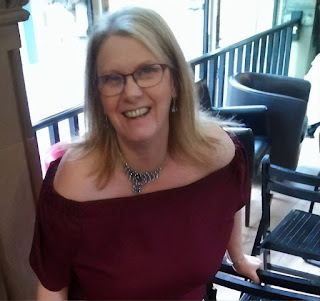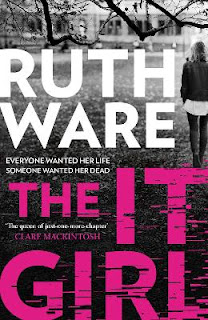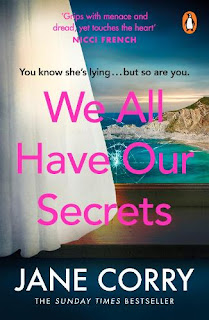Meet Liz Mistry Author Of Dark Memories
This is a very special Thriller Women interview this week because it's our first with an author nominated by a reader of this blog. We're delighted to welcome Liz Mistry talking about Dark Memories, her third crime thriller in the DS Nikita Parekh series, why she loves Bradford and the book about writing she recommends.
Download the ebook of Dark Memories from Amazon or buy the paperback from Thriller Women's list at Bookshop.org. NB: if you buy books through this link we may earn a commission from bookshop.org, whose fees support independent bookshops.
TW: Liz, earlier this year you released your tenth novel, Dark Memories, the third book in the DS Nikita Parekh series. Ten books in five years is quite an achievement, congratulations! What continues to draw you to writing crime fiction?
LM: Crime fiction is my chosen genre to read and so it was a logical progression to write in that genre too... well, that’s the official line. The unofficial line is that my mind takes me to dark places and I love to explore the human stories that lead people to do dark deeds. I write crime fiction because I feel it is redemptive. Where there is darkness there is also light and much as my stories are about evil actions, they are also about the goodness in humanity. I suppose my detectives, Nikki Parekh in my second series and gus McGuire in my first series represent good triumphing over evil.
TW: How did you get your first novel published and did you have to endure much rejection before your writing career took flight?
LM: For years I tried to go down the route of finding an agent but to no avail. It seemed that although the agent liked my writing the competition was too high, so I gave it a rest for a while. I kept writing when I could, but when my mental health became debilitating I was all set to give up completely. However, I was lucky enough to have a GP who recognised that I was on the wrong medication and that it was exacerbating my symptoms, so with the help of him and an excellent dynamic psycotherapist, I gradually came back to the land of the living. At this point I decided I needed something to challenge me and give me a reason to write and so (with real trepidation) I made the best decision ever and enrolled for the MA in Creative Writing at Leeds Trinity University, where with the support of my fellow students and excellent tutors I managed to finsh Unquiet Souls (it had been about 15 years in the making) and decided to brave the world of agent finding again. After numerous rejections I was having a bit of a moan about never managing to get published when Besty Reavley from Bloodhound Books commented that they were open for submissions.
I submitted and within months my first ever novel was published ... still can’t believe it. I then went on to publish four more books with BHB before writing the first of my second series which I submitted to Harper Collins HQ Digital and was accepted. I now am a hybruid author – I self publish all my Gus books and traditionally publish through HQ my Nikki Parekh books. I still don’t have an agent and fell that this works for me.
TW: What was the inspiration behind both DS Nikki Parekh and your other series detective, DI Gus McGuire?
LM: I live in Bradford and I became aware that much of the crime fiction I read seemed to reflect a very narrow section of society and I wanted to widen that. I chose to write my Gus series to reflect the richness of the society in which I live. My own kids are of dual heritage and that was a major decision in making Gus of dual heritage. Of course, because I’m Scottish there had to be a Scottish link. Whilst my husband is Indian British and my kids are of Indian /Scottish descent I chose to make Gus’s mum Jamaican. This was because I had a storyline involving Gus’s mum in mind which had elements of my experiences in a largely mono cultural Scottish rural village in the 1960s & 70s. I finally wrote this storyline in Unbound Ties, book seven of the Gus series.
Nikki Parekh is a product of my daughter’s experiences as a woman of dual heritage, but many of her experiences have been inspired by my own experiences as a teacher in inner city Bradford. I wanted Nikki to be working class, tough, mixed race and yet damaged. She’s all of that and more and as a character I love her. I never quite know where she will take me next.
TW: There is a sense of gritty realism to all your stories. Why did you choose to set them all in Bradford and how has the location shaped your ideas?
LM: I often describe Bradford as ‘Warm, Rich and Fearless’ and it is all that. Bradford has bad press, yet I find it one of the friendliest, most culturally varied places to live. Like any major city it has its challenges, yet it has a huge heart. It has a wealth of cultural heritage and I want to celebrate that. Apart from that, Bradford has a fascinating range of inner city, leafy suburbs and wild and wonderful moors and countryside surrounding it. It is ferocious, beautiful and gentle, yet it has a dark and gritty underbelly that makes it a fascinating place to write about.
TW: Which part of the writing process do you find most challenging, and what part do you most enjoy?
LM: Editing is a pain. I’m a bit of a pantser and love nothing more than sitting down with a scene in mind and seeing where the characters take me. I love the surprise of it all and find that when they do surprising things, my mind then works laterally to fit the jigsaw pieces of the narrative together. That’s the bit I love most. I also hate writing synopses – I just can’t seem to get my head round condensing 120,000 words into a couple of hundred!
TW: How much research do you carry out before putting pen to paper?
LM: I tend to do most of my research as I go along as I never really know what I’ll need to know until the characters tell me. Of course, there are exceptions to this. When I was writing Untainted Blood I spent a lot of time researching racist groups (not enjoyable – but very necessary) and for Last Request I did quite a bit of research into buried bones and stuff because I knew I was going to need that information.
LM: Editing is a pain. I’m a bit of a pantser and love nothing more than sitting down with a scene in mind and seeing where the characters take me. I love the surprise of it all and find that when they do surprising things, my mind then works laterally to fit the jigsaw pieces of the narrative together. That’s the bit I love most. I also hate writing synopses – I just can’t seem to get my head round condensing 120,000 words into a couple of hundred!
TW: How much research do you carry out before putting pen to paper?
LM: I tend to do most of my research as I go along as I never really know what I’ll need to know until the characters tell me. Of course, there are exceptions to this. When I was writing Untainted Blood I spent a lot of time researching racist groups (not enjoyable – but very necessary) and for Last Request I did quite a bit of research into buried bones and stuff because I knew I was going to need that information.
TW: When do you write and what are your writerly bad habits?
LM: I don’t have a set writing routine – I wish I did, but Covid-19 has put paid to that for now. I used to write either in the pub or at Leeds Trinity University from 11am till whenever. Nowadays I’m going with the flow – which isn’t very successful. My biggest bad habit is the one a lot of writers have – prevarication. It’s funny how cleaning the kitchen window takes on such enormous importance when you have a deadline looming.
LM: I don’t have a set writing routine – I wish I did, but Covid-19 has put paid to that for now. I used to write either in the pub or at Leeds Trinity University from 11am till whenever. Nowadays I’m going with the flow – which isn’t very successful. My biggest bad habit is the one a lot of writers have – prevarication. It’s funny how cleaning the kitchen window takes on such enormous importance when you have a deadline looming.
TW: What is the best piece of advice you’ve ever been given about writing crime fiction? And what is the best advice you can offer aspiring crime novelists?
LM: The best piece of advice came from my tutor Martyn Bedford (who is a well known YA novelist as well as a creative writing tutor). He told me to just get the first draft done – not to worry about timelines, grammar, chapter order or anything – just get it down and then go from there. This method works for me. I really work best when my flow isn’t interrupted with editing or remembering if I did such and such in Chapter 3 or if I killed off Benny in Chapter 5 or Chapter 8. Having said that, I have a notebook where I write all these points down so I can check them at the end ... once I realised I had three characters called Billy in the same book but that got sorted out in editing.
Quick fire questions:
TW: Favourite all time fictional detective?
LM: Probably Stuart MacBride’s DCI Roberta Steele – she makes me laugh and I think humour in the darkness is a good thing.
LM: The best piece of advice came from my tutor Martyn Bedford (who is a well known YA novelist as well as a creative writing tutor). He told me to just get the first draft done – not to worry about timelines, grammar, chapter order or anything – just get it down and then go from there. This method works for me. I really work best when my flow isn’t interrupted with editing or remembering if I did such and such in Chapter 3 or if I killed off Benny in Chapter 5 or Chapter 8. Having said that, I have a notebook where I write all these points down so I can check them at the end ... once I realised I had three characters called Billy in the same book but that got sorted out in editing.
Quick fire questions:
TW: Favourite all time fictional detective?
LM: Probably Stuart MacBride’s DCI Roberta Steele – she makes me laugh and I think humour in the darkness is a good thing.
TW: Favourite crime novel and/or author?
LM: Stuart MacBride (because of the humour), Steve Mosby/Alex North (because of the uncanny edge to his writing), and Angela Marsons (kick ass female character – love the Kim Stone series). Mind you tomorrow I could give a different list.
TW: Favourite novel outside the crime/thriller genre?
LM: I don’t read much outside crime fiction but This Green and Pleasant Land by Ayisha Malik made me laugh.
LM: Stuart MacBride (because of the humour), Steve Mosby/Alex North (because of the uncanny edge to his writing), and Angela Marsons (kick ass female character – love the Kim Stone series). Mind you tomorrow I could give a different list.
TW: Favourite novel outside the crime/thriller genre?
LM: I don’t read much outside crime fiction but This Green and Pleasant Land by Ayisha Malik made me laugh.
TW: Best book you’ve read on the craft of writing?
LM: On Writing by Stephen King – you can’t beat it!
LM: On Writing by Stephen King – you can’t beat it!
TW: Best thing about living in Bradford?
LM: Curries, cultural festivals and the people.
When the body of a homeless woman is found under Bradford's railway arches, DS Nikki Parekh and her trusty partner DC Sajid Malik are on the case.
With little evidence, it's impossible to make a breakthrough, and when Nikki receives a newspaper clipping taunting her about her lack of progress in catching the killer, she wonders if she has a personal link to the case.
When another seemingly unrelated body is discovered, Nikki receives another note. Someone is clearly trying to send her clues... but who?
And then a third body is found.
This time on Nikki's old street, opposite the house she used to live in as a child. And there's another message underneath the victim's body.
With nothing but the notes to connect the murders, Nikki must revisit the traumatic events of her childhood to work out her connection to the investigation.
But some memories are best left forgotten, and it's going to take all Nikki's inner strength to catch the killer before they strike again.
LM: Curries, cultural festivals and the people.
Thanks Liz!
More about Dark Memories:
Three letters. Three murders. The clock is ticking ...When the body of a homeless woman is found under Bradford's railway arches, DS Nikki Parekh and her trusty partner DC Sajid Malik are on the case.
With little evidence, it's impossible to make a breakthrough, and when Nikki receives a newspaper clipping taunting her about her lack of progress in catching the killer, she wonders if she has a personal link to the case.
When another seemingly unrelated body is discovered, Nikki receives another note. Someone is clearly trying to send her clues... but who?
And then a third body is found.
This time on Nikki's old street, opposite the house she used to live in as a child. And there's another message underneath the victim's body.
With nothing but the notes to connect the murders, Nikki must revisit the traumatic events of her childhood to work out her connection to the investigation.
But some memories are best left forgotten, and it's going to take all Nikki's inner strength to catch the killer before they strike again.
***
We have lots of interviews with great writers including some big names coming soon on the blog making a it a perfect place to get for summer reading ideas. So you don't miss any of them subscribe to receive a weekly update by clicking on the button at the top of the page and adding your email address.
We have lots of interviews with great writers including some big names coming soon on the blog making a it a perfect place to get for summer reading ideas. So you don't miss any of them subscribe to receive a weekly update by clicking on the button at the top of the page and adding your email address.




Comments
Post a Comment